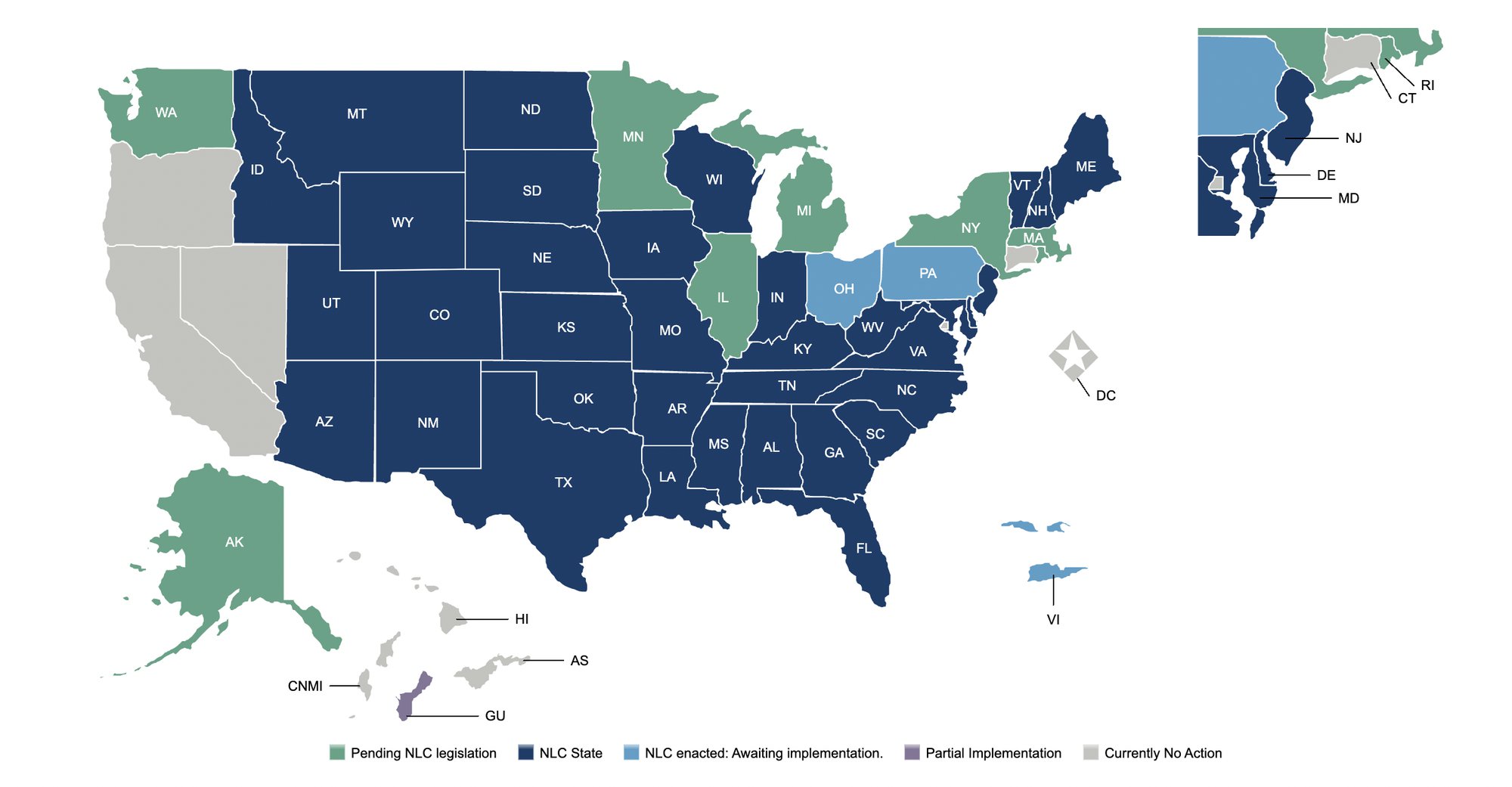39 States, One Nursing License: Complete Guide to Compact States

Nursing is an incredibly rewarding profession. Your care and attention save lives, speed recovery, and improve wellbeing. Now, imagine geographical boundaries no longer tie your ability to offer nursing care to a single state. You can be an RN in multiple states under one nursing license. If you want to relocate to another state and practice over there, there will be no more hassle to get a new RN license for that specific location.
This is the principle behind compact states. You’ve probably heard this term thrown around either in conversation with your nursing school colleagues or your fellow RNs. It is definitely a concept that’s worthy of closer consideration.
In this article, we will talk about compact nursing licenses and states. What they are, which states are included, and where the implementation status is still pending. Moreover, we’ll share how you can get a multistate RN license and what you have to gain from it.
Let’s dive right in.
What Are Compact Nursing States?
Before we move on to examples and lists, we must thoroughly define what compact nursing states are.
Compact nursing states is a term that refers to the Nursing Licensure Compact (NLC). This is an agreement among states that allows Registered Nurses and Licensed Practical Nurses to have one license but have the right to practice nursing in any state partaking in the arrangement.
In 2018, the NLC became the eNLC – the Enhanced Nursing Licensure Compact. With this new agreement, the member states have adopted 11 uniform licensure requirements that an applicant must meet in order to obtain a multistate license. An important distinction between the NLC and eNLC is that the latter requires aspiring nurses to undergo federal and state fingerprint-based criminal background checks.
To put it simply, if you are a legal resident in a compact state, you can practice nursing in any of the other enhanced compact states – and you don’t need to get a new license to do that.
Now, let’s see what states are included in the agreement, which are considering it, and the ones against it.
What States Are Compact States?

Image Source: Nurse Licensure Compact
As of February 2022, 39 states have enacted NLC legislation. These are as follows:
- Alabama
- Arizona
- Arkansas
- Colorado
- Delaware
- Florida
- Georgia
- Guam
- Idaho
- Indiana
- Iowa
- Kansas
- Kentucky
- Louisiana
- Maine
- Maryland
- Mississippi
- Missouri
- Montana
- Nebraska
- New Hampshire
- New Jersey
- New Mexico
- North Carolina
- North Dakota
- Ohio
- Oklahoma
- Pennsylvania
- South Carolina
- South Dakota
- Tennessee
- Texas
- Utah
- Vermont
- Virginia
- Virgin Islands
- West Virginia
- Wisconsin
- Wyoming
What States and Territories Have Partially Implemented the eNCL?
There are some states and US territories that have partially enacted the eNCL. In these places, some restrictions to taking advantage of multistate licenses may apply until implementation is complete and definite. Thus, states and territories pending NLC implementation are:
- Guam. RNs who hold a multistate license in other NLC states can practice nursing in Guam. However, Guam legal residents cannot yet obtain a multistate license until the NLC implementation process is completed in 2022.
- Pennsylvania. In Pennsylvania, NLC has been enacted, but it still awaits implementation, with the date TBD. This means that PA residents cannot obtain a multistate license until implementation is complete, nor can other RNs with multistate licenses work in PA.
- Ohio. In Ohio, the situation is similar to Pennsylvania, with the only difference being that implementation is set for January 1, 2023.
- Virgin Islands. This is another example of a US territory where the NLC has been enacted, and the implementation date is to be determined.

What States Have Pending NLC Legislation?
The following list are the states which have pending legislation for potentially becoming part of the Nursing Licensure Compact.
- Alaska
- Illinois
- Massachusetts
- Michigan
- Minnesota
- New York
- Rhode Island
- Washington
What States Have Taken No Action Towards Becoming Compact Nursing States?
These states are currently not a part of the agreement of the compact states, nor do they have legislation in the works to this end:
- California
- Nevada
- Oregon
- Connecticut
Why Are Some States Hesitant to Become Part of the eNLC?
While most states recognize the multiple benefits of a National Nurse Licensing Compact, not everyone is on board. Some of the reasons critics of eNLC are citing are:
- Each state has different professional development standards. In its current form, the compact does not have a uniform policy for continuing nursing education. That’s why the reluctant states argue that in certain places, there may be little or no professional development for RNs.
- Each state has different licensure and disciplinary standards. Critics say that disputes over jurisdiction may arise as there are substantial differences between state standards.
- A national compact interferes with the oversight of nursing state boards about vetting licenses, tracking licenses, and coordinating disciplinary actions.
- Other arguments against compact states may be related to the loss of state revenue from new nursing licenses or patients’ privacy.

Why Are Compact States Important for Nurses?
Nurses have much to gain from obtaining multistate licensure. First of all, being able to work in multiple states under the same license opens up the door for a broader range of career development opportunities. You’ll have more job flexibility as you are no longer as tied to geographical boundaries. You can practice in up to 39 states – and you are not required to apply for licensure if you decide to relocate between them. To this end, this translates into fewer impediments to practice, fewer application charges, less stress, and barriers to licensure.
While all nurses have to benefit from compact state licensure, the most to win are travel nurses and military personnel. Because of eNCL legislation, they no longer have to spend time and money to apply for licensure in every state they move to – as long as they relocate to a compact state.
How Does the Nursing Compact Benefit the Healthcare System?
Nurses aren’t the only ones reaping the benefits of compact states. So does the healthcare system as a whole. Being able to work unencumbered in multiple states encourages healthcare professional mobility. As a result, nursing shortages could be more easily and efficiently tackled.
Healthcare professional mobility is a valuable asset in difficult times, as well. When natural disasters strike, significant tragedies happen, or pandemics hit, nurses shouldn’t have to jump extra hurdles to be on the frontlines of care when they are already sacrificing so much.
Telehealth coverage is another essential thing with advantages in compact states. Telehealth nursing has been gaining more and more ground in recent years. Unless cross-state nursing licenses become widely recognized, the very principles of telehealth nursing will be defeated as access to nursing care is restricted. Through eNLC, RNs can offer telehealthcare without having to obtain additional licenses.

What Are the Eligibility Criteria for Applying for a Multistate License?
As we already mentioned, to get licensure in a state that is part of the eNCL agreement and be able to practice in all member states, you need to meet 11 requirements:
- You must meet the requirements for licensure in your home state, which is the state where you have legal residency.
- You need to have graduated from a board-approved education program.
- If English is not your native language or the nursing program you pursued was not taught in English, you must pass an English proficiency exam.
- You ought to pass the NCLEX-RN or the NCLEX-PN.
- You need to hold an active, unencumbered nursing license.
- You must pass state and federal fingerprint-based criminal background checks.
- You have never been convicted or found guilty of a felony offense.
- You have no misdemeanor convictions related to the practice of nursing.
- When seeking licensure, you are not part of an alternative program.
- If you are participating in an alternative program, you must disclose this information.
- You have a valid US Social Security number.
On the Move Scenarios
Suppose you are considering relocating. Depending on your current residence and license status, there are some scenarios we should look at more closely.
From a non-compact state to a compact state: You must apply for licensure by endorsement in the new state of residence before or after the move. You will be granted a multistate license if you meet all the residency and eligibility requirements (mentioned above). This will not affect your single-state license issued by the non-compact state.
From a compact state to a non-compact state: In this scenario, before or after the move, you need to apply for licensure by endorsement in the state where you relocate. Your prior multistate license will be changed to a single state license. You need to notify your previous Board of Nursing of your relocation.
From a compact state to a compact state: Should you relocate from one compact nursing state to another, by the time you move, you need to apply for licensure by endorsement. You can practice with the old state license in your new location until the new one is issued. The old one will automatically be rendered inactive when your new multistate license gets activated.

What’s the Current Status of Your License?
Suppose you need to double-check whether your license of compact or not. You can do so by using Nursys. Nursys is the only national database through which RNs and LPNs can verify their nursing license, discipline, and practice privileges. On this platform, you’ll be able to see all your licenses and check their compact status. Moreover, downloading your Nursys report will show you all the states where you are eligible to practice.
What About APRNs?
Unfortunately, the eNLC does not pertain to Advanced Practice Registered Nursing licenses. APRNs need to hold an individual state license in each state of APRN practice. Only RNs and LPNs can have a multistate license via compact states.
However, the NCSBN is currently working on a compact agreement for APRNs. Still, this measure can only be implemented when at least ten states enact the legislation.
Resources to Stay Informed
The list of compact nursing states changes and updates as more states pass legislation and begin transitioning towards becoming members of the agreement. Always stay on top of the latest developments using these valuable resources:
- The Nurse Licensure Compact Official Website.
- NCSBN Website.
- Nursys.
Are You Ready to Start Your Nursing Education?
Being a Registered Nurse is a highly fulfilling career. And through compact nursing state agreements, you can pursue this gratifying career in more locations than ever before – without the hassle of getting a new license when you want to relocate.
The very first step is starting your nursing education. Nightingale College will prepare you to be a great Registered Nurse in any state you choose to practice.
Enroll now in our BSN program or advance your nursing education with our online RN-to-BSN program.

